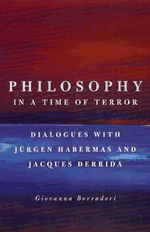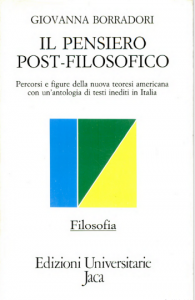Philosophy in a Time of Terror: Dialogues with Jürgen Habermas and Jacques Derrida (2003)
 “The idea for Philosophy in a Time of Terror was born hours after the attacks on 9/11 and was realized just weeks later when Giovanna Borradori sat down with Jürgen Habermas and Jacques Derrida in New York City, in separate interviews, to evaluate the significance of the most destructive terrorist act ever perpetrated. This book marks an unprecedented encounter between two of the most influential thinkers of our age as here, for the first time, Habermas and Derrida overcome their mutual antagonism and agree to appear side by side. As the two philosophers disassemble and reassemble what we think we know about terrorism, they break from the familiar social and political rhetoric increasingly polarized between good and evil. In this process, we watch two of the greatest intellects of the century at work.”
“The idea for Philosophy in a Time of Terror was born hours after the attacks on 9/11 and was realized just weeks later when Giovanna Borradori sat down with Jürgen Habermas and Jacques Derrida in New York City, in separate interviews, to evaluate the significance of the most destructive terrorist act ever perpetrated. This book marks an unprecedented encounter between two of the most influential thinkers of our age as here, for the first time, Habermas and Derrida overcome their mutual antagonism and agree to appear side by side. As the two philosophers disassemble and reassemble what we think we know about terrorism, they break from the familiar social and political rhetoric increasingly polarized between good and evil. In this process, we watch two of the greatest intellects of the century at work.”
Click here to read an excerpt from the book
- The Village Voice (2003)
- Continental Philosophy Review (2003)
- German Law Journal (2003)
- The New Republic (2004)
- The Review of Metaphysics (2005)
- Philosophy and Social Criticism (2005)
The American Philosopher: Conversations with Quine, Davidson, Putnam, Nozick, Danto, Rorty, Cavell, MacIntyre, and Kuhn (1994)
“In this lively look at current debates in American philosophy, leading philosophers talk candidly about the changing character of their discipline. In the spirit of Emerson’s The American Scholar, this book explores the identity of the American philosopher. Through informal conversations, the participants discuss the rise of post-analytic philosophy in America and its relations to European thought and to the American pragmatist tradition. They comment on their own intellectual development as well as each others’ work, charting the course of American philosophy over the past few decades. Giovanna Borradori, in her substantial introduction, explains the history of the analytic movement in America and the home-grown reaction against it. In the late nineteenth and early twentieth centuries, American philosophy was a socially engaged interdisciplinary enterprise. In transcendentalism and pragmatism, then the dominant currents in American thought, philosophy was connected to history, psychology, and public issues. But in the 1930s, the imported European movement of logical positivism redefined philosophical discourse in terms of mathematical logic and theory of language. Under the influence of this analytic view, American philosophy became a professionalized discipline, divorced from public debate and intellectual history and antagonistic to the other, more humanistic tradition of continental thought. The American Philosopher explores the opposition between analytic and continental thought and shows how recent American work has begun to bridge the gap between the two traditions. Through a reexamination of pragmatism, and through an attempt to understand philosophy in a more hermeneutical way, the participants narrow the distance between America’s distinctly scientific philosophy and Europe’s more literary approach. Moving beyond classical analytic philosophy, the participants confront each other on a number of topics. The logico-linguistic orientations of Quine and Davidson come up against the more discursive, interdisciplinary agendas of Rorty, Putnam, and Cavell. Nozick’s theory of pluralist anarchism goes face-to-face with the aesthetic neo-foundationalism of Danto. And Kuhn’s hypothesis of paradigm shifts is measured against MacIntyre’s ethics of “virtues.” Borradori’s conversations offer an unconventional portrait of the way philosophers think about their work; scholars and students will not be its only beneficiaries, so will everyone who wonders about the current state of American philosophy.”
Recoding Metaphysics: The New Italian Philosophy (1989)
“Recoding Metaphysics: The New Italian Philosophy presents for the first time in English the work of many leading Italian contemporary thinkers. It suggests a third way in the hitherto almost exclusively French and German discussion of the deconstructive critique of poststructuralism on one hand, and the emancipatory convictions of post-Marxist discourse on the other. Each essay attempts to establish the validity of this third way, some by developing the concept of “weak thought” through rigorous analysis of Marxism and a reinterpretation of Nietzsche’s nihilism and Heidegger’s existentialism, and others by developing alternative critiques to postructuralist thinking.”
Il Pensiero Post-Filosofico (1988)
 “Il pensiero post-filosofico, più che un movimento o un programma teorico unitario, rappresenta la distanza che ancora oggi distingue il concetto di filosofia tra le due sponde dell’Atlantico. L’esplorazione di questo spazio teorico accompagna l’emergere della nozione di pensiero post-filosofico lungo il viaggio che questo volume invita a compiere attraverso la filosofia americana contemporanea. Sin da Ralph Waldo Fmerson la speculazione americana, abbandonati i concetti di sistema e fondazione, “ha aperto” gli orizzonti verso quelli di proliferazione e pluralità. La creazione demiurgica di vocabolari nuovi e “mortali”, anziché la riscrittura ermeneutica o “citativi” di lessici già sperimentati, rappresenta qui un’inedita valenza del prefisso “post”. Il linguaggio è l’orizzonte su cui si gioca l'”apertura” del pensiero: non si dà un mondo che non sia già una teoria sul mondo. Il linguaggio non é lo strumento della rappresentazione dei mondo e della comunicazione tra gli uomini, bensì l'”organo” che permette di mantenersi accanto agli uomini e alle cose, e crescere in “prolifica intimità con i fatti”. La filosofia, amputata di ogni slancio prometeico, non è più il “testo dei testi”, bensì un kind of writing: una scrittura, tra le molteplici scritture che popolano l’universo elastico delle Humanities. In tutte le sue molteplici articolazioni – qui documentate con un’antologia di testi inediti in Italia di Paul de Man, Fredric Jameson, Edward W. Said, Harold Bloom, Arthur C. Danto, Stanley Cavell, Ibab Hassan, Richard Rorty – il pensiero post-filosofico testimonia del suo essere il prodotto di una tradizione peculiarmente americana, che sta “oltre” l’orizzonte cartesiano e illuministico della modernità, suggerendone insospettate prospettive di superamento.”
“Il pensiero post-filosofico, più che un movimento o un programma teorico unitario, rappresenta la distanza che ancora oggi distingue il concetto di filosofia tra le due sponde dell’Atlantico. L’esplorazione di questo spazio teorico accompagna l’emergere della nozione di pensiero post-filosofico lungo il viaggio che questo volume invita a compiere attraverso la filosofia americana contemporanea. Sin da Ralph Waldo Fmerson la speculazione americana, abbandonati i concetti di sistema e fondazione, “ha aperto” gli orizzonti verso quelli di proliferazione e pluralità. La creazione demiurgica di vocabolari nuovi e “mortali”, anziché la riscrittura ermeneutica o “citativi” di lessici già sperimentati, rappresenta qui un’inedita valenza del prefisso “post”. Il linguaggio è l’orizzonte su cui si gioca l'”apertura” del pensiero: non si dà un mondo che non sia già una teoria sul mondo. Il linguaggio non é lo strumento della rappresentazione dei mondo e della comunicazione tra gli uomini, bensì l'”organo” che permette di mantenersi accanto agli uomini e alle cose, e crescere in “prolifica intimità con i fatti”. La filosofia, amputata di ogni slancio prometeico, non è più il “testo dei testi”, bensì un kind of writing: una scrittura, tra le molteplici scritture che popolano l’universo elastico delle Humanities. In tutte le sue molteplici articolazioni – qui documentate con un’antologia di testi inediti in Italia di Paul de Man, Fredric Jameson, Edward W. Said, Harold Bloom, Arthur C. Danto, Stanley Cavell, Ibab Hassan, Richard Rorty – il pensiero post-filosofico testimonia del suo essere il prodotto di una tradizione peculiarmente americana, che sta “oltre” l’orizzonte cartesiano e illuministico della modernità, suggerendone insospettate prospettive di superamento.”


